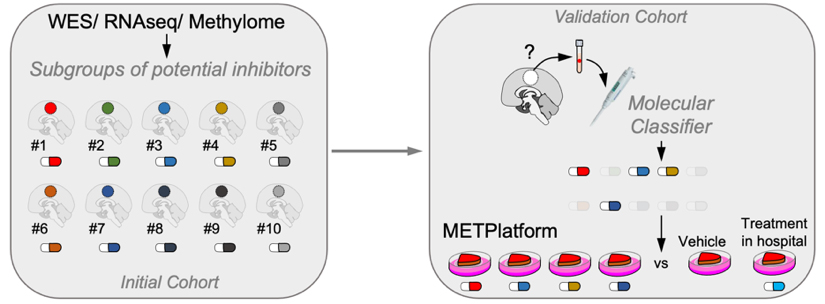- Omics
BrMETomic
- Can we identify brain metastases subtypes by analyzing large omic datasets?
A drug-screening platform based on organotypic cultures identifies vulnerabilities to prevent local relapse and treat established brain metastasis.
Zhu L, et al. BioRxiv. (2020).
Viewpoint: Brain Metastasis
Boire A, Brastianos P, Garzia L and Valiente M. Nat Rev Cancer. (2020).
The evolving landscape of brain metastasis.
Valiente M et al. Trends in Cancer. (2018).
A clinically-compatible drug-screening platform based on organotypic cultures identifies vulnerabilities to prevent and treat brain metastasis.
Zhu L, et al. EMBO Molecular Medicine. (2022).
Protocol to generate murine organotypic brain cultures for drug screening and evaluation of anti-metastatic efficacy
Lucía Zhu, Lauritz Miarka, Patricia Baena, María Perea-García, Manuel Valiente. STAR Protocols (2023)

A general finding in patients with brain metastasis is that even in a situation where the systemic disease is under control, the disease in the brain does not respond to the same treatment. During recent years efforts from multiple labs have created multi-omic profiles of human brain metastases. There are findings suggesting that metastases in the brain could follow evolutionary trajectories differing from extracranial.
We are collecting data from all published works and profiling all human brain metastases collected through RENACER to evaluate whether we identify subgroups of brain metastases attending to their molecular profiles, independently of any other variable (i.e., primary tumor). We link this classification to potential drugs that could, in the future, be used to treat specific subgroups of metastases. Initially, drugs will be validated using METPlatform in patient-derived organotypic cultures collected through RENACER.
This project aims to increase the opportunities to patients with brain metastasis. We are convinced that the combination of METPlatform with a genetic classifier linked to specific drugs could contribute to expand the targeted therapies that could be applied to patients with brain metastasis.
